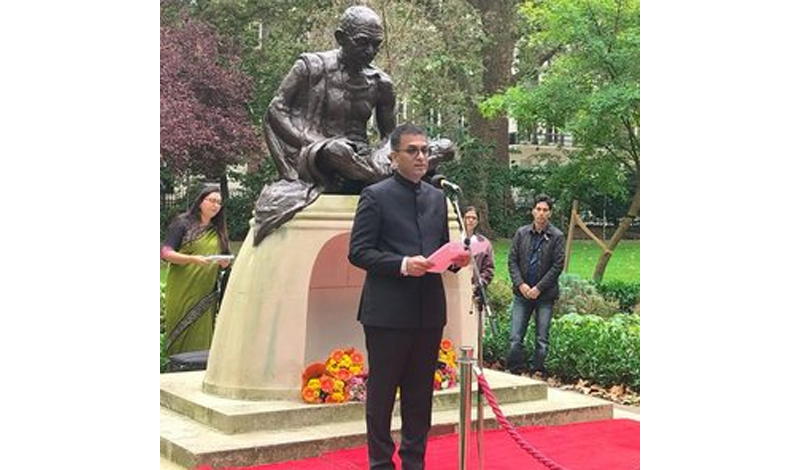LONDON, Oct 2: The Chief Justice of India, Justice Dhananjaya Yeshwant Chandrachud, and Maharashtra Minister for Cultural Affairs Sudhir Munganitwar were among the special guests at the annual Gandhi Jayanti celebrations in London today.
The Indian diaspora gathering at the iconic Gandhi statue at Tavistock Square in London, assembled by the Indian High Commission in London and India League, included floral tributes to the Mahatma and addresses reflective of his message.
Students of the Bharatiya Vidya Bhavan in London performed a selection of Mahatma Gandhi’s favourite bhajans, including ‘Raghupati Raghav’ and ‘Vaishnava Jan’, as community leaders and parliamentarians gathered for the sombre ceremony which concluded with a Buddhist prayer.
“Today, on his 154th birth anniversary, we remember Mahatma Gandhi for his teachings, wisdom and compassion for humankind,” said Justice Chadrachud in his address to the gathering.
“Mahatma Gandhi is a name that is known to everyone in the world. A name which stands for the principle of truth and non-violence. A name which calls for universal peace. A name which inspires hope that we shall make our world a better place than it was before,” he said.
The Chief Justice described Bapu, as he is lovingly known in India, as a guiding light for all Indians in a spiritual sense.
“His ideas have persisted over time as a tool of social change, non-violent ways of life and humanism. Bapu’s legacy extends far beyond the boundaries of India,” he added.
Minister Munganitwar, who is in London to sign a memorandum of understanding (MoU) with the Victoria and Albert (V&A) museum for the display of Chhatrapati Shivaji’s 17th century “Tiger Claws” in Mumbai later this year, highlighted the global significance of Gandhi’s message.
“This day is marked the world over as the International Day of Non-Violence because of the mantra of ahimsa given by Mahatma Gandhiji,” he said in a speech in Hindi.
The minister also spoke about his personal connection with the great leader as a guardian minister of the Gandhi Sevagram Ashram in Wardha, Maharashtra.
“The charkha became like a weapon of peace in the hands of every Indian. It is important that this day of non-violence is not just one day for us, but a way of life,” he said.
The Indian High Commissioner, Vikram Doraiswami, who later made his way to the Gandhi statue at Parliament Square, also reflected upon the enduring legacy of the Father of the Indian nation.
“As he said, we need to find within us the strength and moral character and the force of purpose to do the right thing, to be the best we can be and the best way of doing that is to be there for everybody else,” said Doraiswami.
At the Gandhi statue in Parliament Square, the All Party Parliamentary Group (APPG) on India (Trade and Investment) organised a gathering led by Indian-origin peer Lord Meghnad Desai.
“He taught us how to fight against injustice and cruelty, peacefully. We remember him for that and for winning India its freedom,” said Lord Desai. PTI


